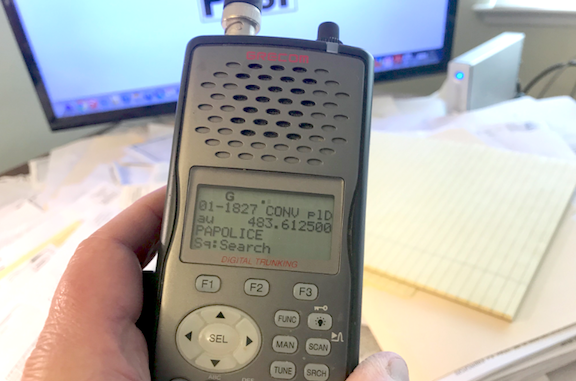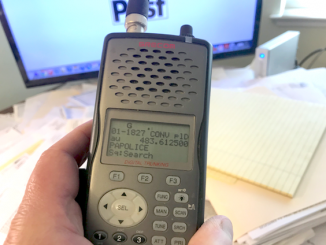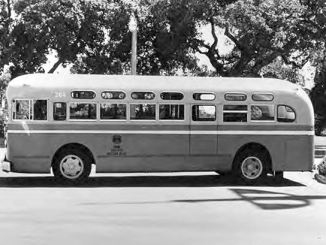
The following story was first published in Saturday’s Daily Post. If you want to get the latest local news, pick up the Post in the mornings at 1,000 Mid-Peninsula locations.
BY KYLE MARTIN
Daily Post Staff Writer
Palo Alto Mayor Tom DuBois said Friday (Jan. 8) that the police department’s move to encrypting its radio transmissions was a mistake.
Palo Alto police began encrypting their radio transmissions Tuesday (Jan. 5) to stop transmitting personally identifiable information over the airwaves because of a policy memo from the state Department of Justice last October.
Both the Post and the Palo Alto Weekly published editorials Friday criticizing the encryption, a rare move for the two papers, whose editorial pages hardly ever agree.
“I think staff felt like it was a smaller issue than they expected and they kind of made a bit of a mistake there,” Wednesday that the policy was “probably a good idea in terms of protecting people’s information,” but changed his mind because of reporting and editorials published by the two papers in town. DuBois said the council will bring a discussion on the radio encryption to a public hearing in late February because the “two newspapers basically rely on this information.”
Vice Mayor Pat Burt said he wants the scanners to be a topic of public discussion, instead of sweeping the decision under the rug.
“I think that the way that they did it without understanding the point of view of the council and the press and how this might impact transparency in the community is clearly a mistake,” Burt told the Post. “We may end up concluding still that we don’t have any better alternative in meeting the state legal requirements, but the department of justice directive didn’t say it must be encrypted scanners.”
Burt said he, DuBois, City Manager Ed Shikada and Police Chief Bob Jonsen all agreed police “underappreciated how this change would be reviewed” by the public when police implemented the encryption without public input.
The group also discussed that police have had trouble keeping up with public information requests and media inquiries because of budget cuts to the police department that removed public information officers and the head of police dispatch from the department.
Burt added the lack of public radio transmissions, coupled with reduced staff and budget cuts to police, “clearly reduced the transparency” of the police department.
“The encryption of scanners is on top of the press having experienced other, greater restrictions on their access to the police over the last year or so. And I think that that is equally as important,” Burt said. “And their role, whether we always agree with how the press does their job, is not the issue.”
Scanners in use since 1940s
Reporters, police watchdogs and regular citizens for decades have relied on police scanners to monitor developing emergencies and dispatches in real time. Since the 1940s, the public has been able to listen to the transmissions of police and fire departments across the country. Palo Alto police last August cut off reporters from interviewing officers and relegated all media inquiries to a city website.
The encryption was announced in an anonymous email sent to the news media at 1:28 p.m. Tuesday, just minutes before the plug was pulled on transmissions.
No one from the Post has spoken with Jonsen about the encryption of police radio transmissions, but the police chief defended his decision to encrypt radio transmissions in a post on the website Medium on Wednesday. He wrote that Palo Alto is not the first city to encrypt their police radio transmissions, and he said more cities in Santa Clara County will do the same.
A count by the Post indicates that of the 509 police agencies in California, 21 in addition to Palo Alto have opted to encrypt their transmissions. That means about 96% of police agencies still make their broadcasts available to the public.
This story has been updated to include additional police agencies that encrypt their radio frequencies.




What are the police trying to hide? If they can communicate personal information via cellphone, then why take the extra step of silencing all radio traffic? I think they’re trying to keep information from the public.
I served as a first responder (search and rescue) for a Sheriff’s office in the area, and frequently used the radios. There is some pretty sensitive information. For example, I inadvertently learned of the criminal record of the son of a friend of mine when monitoring radio traffic. There is also a lot of information which could be used for identity theft. There were many times when we did not want immediate information to go out on an open radio, such as the discovery of a deceased subject, something which would attract a lot of ghouls with their cameras. If a loved one of yours committed suicide by hanging,for example, would you want to see their hanging body on the news? It might draw viewers, but is there a legitimate public need being served?
@squidsie, you say a lot of information goes out on the radio that can lead to identity theft. Care to cite an example? People are arrested every day for identity theft (according to the police blotter), so name one case where this actually happened?
You say that broadcasting information about a “deceased subject” will bring out the “ghouls with cameras.” Police radio transmissions have been public since the 1940s. In the 80-year history of public police radios, can you give an example of when this happened? Not a theoretical or hypothetical, but if this is such a big problem, I’m sure you can name an instance immediately.
@walter ganz: Name, address, drivers license number and date of birth, are commonly given, and are useful for identity theft. The nature of identity theft is such that it is very often impossible to determine the source of the information used. The fact that you rarely see pictures of bodies in the reputable media doesn’t mean that it doesn’t happen. Check the tabloids and the ubiquitous internet sites catering to depraved tastes. It is not a frequent problem because first responders take care to avoid disclosing this information on open air, instead using code words or cell phones.